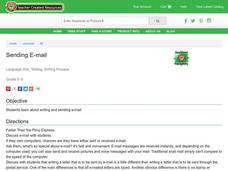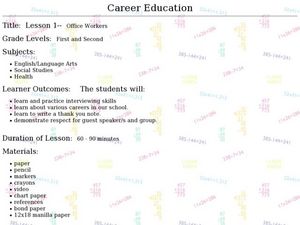Museum of Tolerance
Making Lemonade: Responding to Oppression in Empowering Ways
An activity focused on tolerance encourages class members to consider how they might respond when they or someone else is the target of oppression and discrimination. After researching how some key figures responded to the anti-Semitism...
Described and Captioned Media Program
Malcolm X: Make It Plain, Part II
Track the transformation of Malcolm Little into Malcolm X and then into El Jajj Malik El-Shabazz with the second part of Make it Plain, a documentary on the famous civil rights activist. Viewers consider not only how events shaped and...
Curated OER
New World Meets Old
Students demonstrate understanding of basic facts about Christopher Columbus and different theories regarding his background. They try to solve the mystery of Christopher Columbus' background and write an essay offering their own opinion.
Curated OER
Identifying and Using Parts of Speech in Writing: Technology, Word Processing
Students identify and suggest suitable parts of speech to fill in the blanks in a prepared text (the text can easily be tailored to language ability and desired subject). They use word processing to edit the text.
Curated OER
Moths and Butterflies crossword puzzle
In this moths and butterflies worksheet, students complete a crossword puzzle about moths and butterflies. Students complete 26 blanks in the crossword puzzle.
Curated OER
Deerfield Debates Its Future: What Constitutes Progress?
Students explore the many resources that one can use to explore a community, the Colonial Revival movement, and how the industry and technology reshaped life in Deerfield the Connecticut River Valley.
Curated OER
Seussville: Who Said That?
In this Dr. Seuss worksheet, students read five quotations from books written by Dr. Seuss. Students match the quotes with the characters who said them.
Curated OER
Sending E-mail
Middle schoolers learn about writing and sending e-mail. They discuss the differences between the ways messages may travel. Then, they learn and compare the writing process between e-mail and regular mail.
Curated OER
Harvesting the Crop
What is philanthropy? To find out learners explore the concept through class discussion. They survey, make decisions, implement, and reflect on a service project intended to benefit their community.
Curated OER
Castaway or Survivor
What a clever idea! Chemistry learners imagine themselves deserted on an island with a radio, but no batteries. They also have a few odds and ends in their pockets and storage chest. They are challenged to create a battery that will...
Curated OER
The Art of Persuasion-Analysis of Argument
Analyze advertising techniques in order to pinpoint persuasive strategies that writers use. These same techniques are then examined in persuasive speeches. You will have to find your own advertisements, but speeches are included. Finish...
Curated OER
Calligraphy, Handwriting And The Alphabet
Students produce calligraphy projects using writing skills and unique tools in this six-day Art activity. Emphasis is placed upon the work of Portland, Oregon calligraphy artist Inga Dubay and her experiences with "Italic" writing...
Curated OER
Why Do Authors Write?
Sixth graders use short reading passages to identify, explain, and discuss the author's purpose for writing. After a lecture/demo, they utilize a graphic organizer embedded in this plan to organize their writing ideas.
Curated OER
Pick a Pet
Students design informational materials to educate people on the importance of matching a new pet to the family's lifestyle and living arrangements. Students use critical thinking skills to make a decision on the appropriate choice for a...
Curated OER
Who? What? Why? - Using Interrogative Pronouns
Interrogative pronouns are an important part of learning the interrogative sentence form. Middle schoolers learn about using interrogative pronouns in sentence writing, and use what they read to answer the nineteen questions on the...
Curated OER
Mean, Median and Mode (I)
In this online math worksheet, find the mean, median, and mode in a variety of sets of data. This excellent resource allows the students to check their answers, and to get "hints" should they run into difficulties. A terrific teaching tool!
Curated OER
The Flow of Women's Work: How Cultures are Alike and Different?
Students examine gender roles in various cultures. In this flow of women's work activity, students compare water related work in rural Africa to that in their own households.
Curated OER
Career Education: Office Workers
Frist and second graders explore career options. First they will watch career videos and then prepare to interview school personnel regarding their job responsibilities. They will then send thank you cards to the interviewed subjects...
Curated OER
Looking and Learning in the Art Museum
Reflect on the art your class can view at a museum. In this art history lesson, students draw six elements of art. They discuss original art versus reproduction artwork and write about their thoughts of a museum. It would be wonderful if...
Curated OER
Identify and Discuss the Author's Purpose
Examine author's purpose in a persuasive text using this scaffolded plan. You essentially have a verbatim script here, but it can definitely be used as an outline instead. Review questions that readers should ask themselves when...
Curated OER
Vocabulary: Multiple Meaning Words in Context
Learners use context clues to define words with multiple meanings. After extensive practice with their teacher, learners read through six sentences, they then identify a word with a multiple meaning, and determine its meaning based on...
Curated OER
Money and Credit: Making Good Decisions
Middle schoolers participate in activities that teach them how to manage money. In this managing money lesson plan, students set long and short term goals for economic success by having discussions, identifying benefits of saving, and...
Curated OER
Internet Exploring
Learners access the Internet to answer a variety of questions posed in this technology lesson.
Curated OER
Nonfiction Lessons That Motivate
Incorporating nonfiction lessons into literature instruction can be interesting and engaging for all students.

























